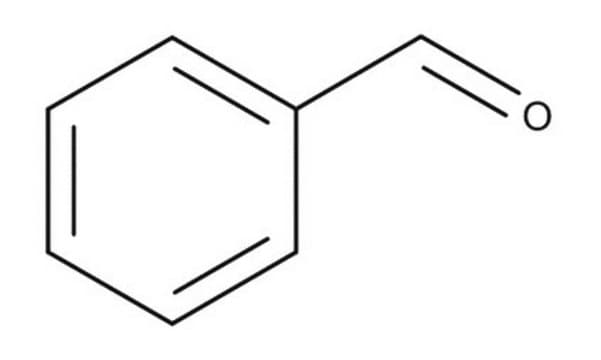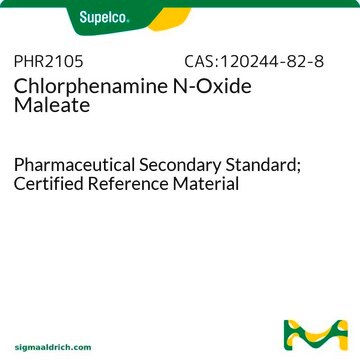PHR1203
Benzaldehyde
Pharmaceutical Secondary Standard; Certified Reference Material
Synonym(s):
Bitter almond
About This Item
Recommended Products
grade
certified reference material
pharmaceutical secondary standard
Quality Level
Agency
traceable to USP 1050905
vapor density
3.7 (vs air)
vapor pressure
4 mmHg ( 45 °C)
API family
benzaldehyde
autoignition temp.
374 °F
expl. lim.
1.4 %, 20 °F
storage condition
protect from light
technique(s)
HPLC: suitable
gas chromatography (GC): suitable
refractive index
n20/D 1.545 (lit.)
bp
178-179 °C (lit.)
mp
−26 °C (lit.)
density
1.044 g/cm3 at 20 °C (lit.)
application(s)
cleaning products
cosmetics
flavors and fragrances
food and beverages
personal care
pharmaceutical (small molecule)
format
neat
storage temp.
2-30°C
SMILES string
O=Cc1ccccc1
InChI
1S/C7H6O/c8-6-7-4-2-1-3-5-7/h1-6H
InChI key
HUMNYLRZRPPJDN-UHFFFAOYSA-N
Looking for similar products? Visit Product Comparison Guide
General description
Benzaldehyde is an important flavoring agent after vanillin. It is usually liberated from a cyanogenic glycoside such as amygladin, which is found in fruit kernels.
Application
Analysis Note
Other Notes
Footnote
Recommended products
related product
Signal Word
Danger
Hazard Statements
Precautionary Statements
Hazard Classifications
Acute Tox. 4 Inhalation - Acute Tox. 4 Oral - Aquatic Chronic 2 - Eye Irrit. 2 - Repr. 1B - Skin Irrit. 2 - STOT SE 3
Target Organs
Respiratory system
Storage Class Code
6.1C - Combustible acute toxic Cat.3 / toxic compounds or compounds which causing chronic effects
WGK
WGK 1
Flash Point(F)
145.4 °F - closed cup
Flash Point(C)
63 °C - closed cup
Certificates of Analysis (COA)
Search for Certificates of Analysis (COA) by entering the products Lot/Batch Number. Lot and Batch Numbers can be found on a product’s label following the words ‘Lot’ or ‘Batch’.
Already Own This Product?
Find documentation for the products that you have recently purchased in the Document Library.
Customers Also Viewed
Protocols
-Tolualdehyde; Valeraldehyde; Isovaleraldehyde
Our team of scientists has experience in all areas of research including Life Science, Material Science, Chemical Synthesis, Chromatography, Analytical and many others.
Contact Technical Service












